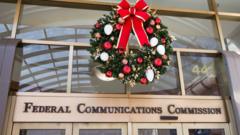The recent Sixth Circuit Court of Appeals decision overturns net neutrality guidelines, galvanizing further Congressional action amidst an ongoing debate over internet regulation.
Court Affirms Rejection of Net Neutrality Regulations

Court Affirms Rejection of Net Neutrality Regulations
Court ruling denies Biden administration's net neutrality restoration efforts, impacting internet access in the U.S.
In a significant ruling, the Sixth Circuit Court of Appeals has dismissed the Biden administration's attempt to reinstate net neutrality regulations, asserting that the federal government lacks the authority to oversee internet service providers (ISPs) as public utilities. This decision represents a substantial setback for proponents of an open internet, who have long advocated for rules that mandate ISPs, like AT&T, maintain equal treatment of all legal content.
Net neutrality rules were initially established under the Obama administration but faced repeal during Trump's presidency. The court's ruling, coinciding with Trump's potential return to the White House, seemingly brings the drawn-out legal dispute surrounding net neutrality to a close. Judges emphasized that changing political administrations have led to inconsistent interpretations of internet regulation but noted a recent Supreme Court ruling that constrains federal agencies from broad interpretations of their authority. As articulated by the Sixth Circuit, "Applying Loper Bright means we can end the FCC's vacillations."
Brendan Carr, a Republican FCC commissioner appointed by Trump, expressed satisfaction with the court’s ruling, criticizing the Biden administration's attempts to extend control over the internet. Conversely, outgoing Democratic FCC Commissioner Jessica Rosenworcel highlighted consumer concerns and called for Congress to create permanent net neutrality laws, stating, "With this decision, it is clear that Congress now needs to heed their call, take up the charge for net neutrality, and put open internet principles in federal law."
The net neutrality debate in the U.S. previously ignited intense discussions, pitting internet providers against major tech firms, including Google and Netflix. Advocacy from public figures, such as comedian John Oliver, has historically galvanized public support for these regulations, demonstrating the potential for mass mobilization.
Notably, Thursday's decision does not impact state-level net neutrality initiatives, which may continue to offer similar consumer protections. Nonetheless, supporters argue that without national regulations, ISPs could gain the latitude to limit access or impose fees for high-speed content delivery.
Public Knowledge, an advocate for internet policy reform, voiced concerns that the ruling undermines the FCC’s ability to enforce crucial privacy standards and public safety regulations, positing that the court's characterization of ISPs as merely information services damages regulatory authority. In contrast, USTelecom, an industry group representing major telecommunications companies, hailed the ruling as a triumph for consumers, suggesting it would promote investment and foster innovation in the current digital landscape.






















